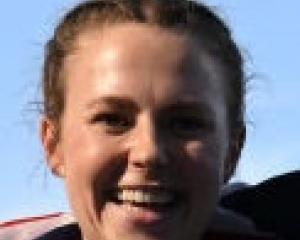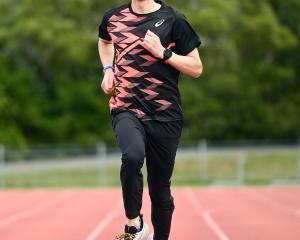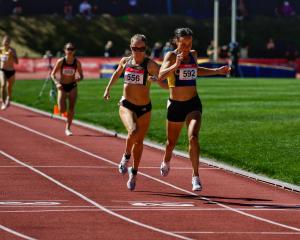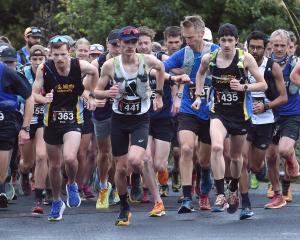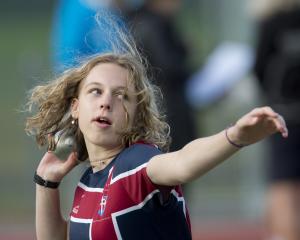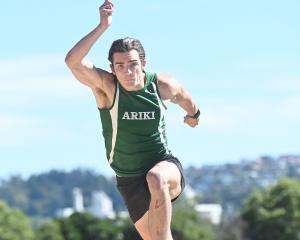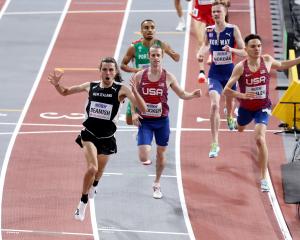Hayden Meikle: Why do a book at this stage of your life?
Roy Williams: We were sitting round over a Chinese meal, and I was telling a few stories. People were asking me about the Keith Murdoch incident, and the Olympics I'd covered. There was so much stuff there. I thought about it for 12 to 18 months and then jotted down a few chapter headings.
HM: Have you kept a diary all these years or have you just got a really good memory?
RW: I do have a good memory. But every tour I went on, I kept a cardboard box of mementoes. Programmes for rugby tours, photo albums and things. I had to use Google a fair bit to flesh out some details.
HM: What sort of role did Dunedin play in your development as a person and an athlete?
RW: Well, I went to the old Dunedin Technical High School. Had four years there. I was born in Dunedin. Dad was actually an Australian who went to World War 1 when he was 17. He was wounded and couldn't find work, and he made his way to Dunedin and met Mum. We lived at Broad Bay during the Depression with Mum's father and mother. Dad would walk from Broad Bay into the city and back to look for work. Life was pretty tough, but we survived, and we were taught that hard work never hurt anyone.
HM: Was sport always a big part of your life?
RW: Dad had never had any opportunity to play sport. Mum was a highland dancing champion and taught all round the South Island. People always ask Yvette and I if our parents played sport, but they never really had the opportunity. We just loved sport, and playing games. We lived at Caversham for 20 years and made our own fun. We played marbles, flew kites, made bows and arrows, and developed our own steeplechase course by the railway line. And we were close to Carisbrook, so I used to go and watch Otago in the Cavanagh era. I played cricket and a bit of rugby. I was pretty good at rugby but I broke my arm when I was 18. I started to train seriously for athletics at that stage. Yvette had won the Olympic gold medal in 1952, and I wanted to emulate her as best I could.
HM: Is it true that at one stage you guys did not even realise what the Olympics were?
RW: That's a good little anecdote. Teddy Isaacs, the sports editor of the Otago Daily Times, was interviewing Yvette. He told her that she might get to the Olympic Games one day. She replied: ''What are the Olympic Games?'' There had been no Olympics during the war years, so she just hadn't given them any thought.
HM: Did it take you a while to claim your own identity as an athlete and not just be ''Yvette's little brother''?
RW: We used to compete at the old Caledonian in South Dunedin. We'd line up for the 100 yards or the hurdles, and the announcer would say, ''In lane three is Yvette's younger brother''. At parties, everyone would describe me as Yvette's brother. It used to bug me. I decided I needed to achieve something in my own right.
HM: Was winning the gold medal in the Commonwealth Games decathlon in Kingston in 1966 the moment you really felt you had stepped out from her shadow?
RW: Pretty much, though I already had about nine New Zealand titles by then, and I'd had the Commonwealth record for six years. I was reasonably high profile.
HM: Why did you never compete at the Olympics?
RW: I'd been nominated three times, and missed out. I still believe I should have been selected. I still don't know why I wasn't, to this day. I was ranked in the top 10 to 12 in the world on each occasion. It's a mystery. I was quite outspoken, and maybe that hurt my chances. It still burns deeply that I wasn't able to represent New Zealand at the Olympics.
HM: As well as your athletics career, do you look back with pride on your journalism career?
RW: I never considered myself a career journalist. My life was just sport, and journalism could pay the bills. I did it to the best of my ability and had some fantastic experiences.
HM: Keith Murdoch - you were right there?
RW: We stayed at the same hotel, the Angel. We went out to dinner that night and had come back for a drink. Lin Colling was there, and Keith. Keith was in a great mood. We were in the foyer later and Peter Grant, this big security guard, came bursting in and said, ''That bastard Murdoch just king-hit me in the eye''. We didn't know what had happened. Keith disappeared. We tried to find him, but couldn't. We later found out Keith had gone into the kitchen to get a late-night snack and had got into this argument with the bloke. The manager, Ernie Todd, came in and told Keith he was on the next plane home. So Keith figured he might as well make a job of this bloke. It was very sad. Keith was almost an innocent party.
HM: Were you ever tempted to try to track Keith down?
RW: Not really, no. I was pretty close to him.
HM: Do you watch lots of sport still?
RW: I do. During the Commonwealth Games, I only had about five hours' sleep a night. I watched Lydia Ko for a few hours the other day. All the rugby and that sort of stuff.
HM: The question of who was the greatest New Zealand sportswoman could always be answered: ''Yvette Williams''. But do you think Valerie Adams is about to claim that title?
RW: I know I'm parochial but I would still go for Yvette. She did it under far, far more difficult circumstances. Valerie has never had to worry about where her next dollar comes from, and she's always had top coaches and a masseuse. Yvette had to do most of it on her own. She was working nearly fulltime at one stage and still training three times a day. Totally different world. Yvette was considered, in her era, the best all-round athlete in the world.
HM: What about decathlon? Will we ever have another New Zealand champion at the Commonwealth Games?
RW: I think so. Brent Newdick was second in Delhi. Simon Poelman had the ability but he took shortcuts. It's getting more difficult because the standard is so much higher.
- Sports Crazy: A Lifetime in Kiwi Sport (Bateman) is out now.


